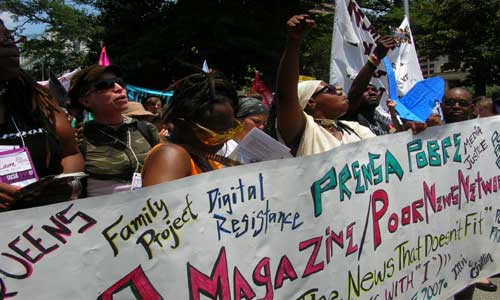POOR Magazine's Race, Poverty, Youth and Disability Scholars reflect on their experience at the US Social Forum in Atlanta
 |
|
by Staff Writer by Laure McElroy/PNN columnist, welfareQUEEN, race, poverty and disability scholar This is how we do it at POOR; using the " I ", the first person, we centerpiece our own knowledge. We choose to use who we are and what we’ve personally experienced as both the keystone narrative for any story we write, as well as the lens through which we interpret it. We believe that doing this is the best way to be honest about where one’s point of view is coming from, and that the journalistic cult of the third person in this country is not objective at all, but rife with hidden, mostly privileged bias. We also insist that those who experience it must create the news, rather than any non-participant journo, however formally educated; those who live the stories both interpret the stories and claim the byline at POOR. The Ida B. Wells Media Justice center at the US Social Forum was an original proposal authored by POOR. Our vision was to create a space for non-hierarchical story generation, print, radio or blog. The USSF seemed like the perfect place to model a setup for media creation that was not elitist and that did not reflect mainstream hegemonies (powerful interviewer/passive interviewee; writer-outsider who interprets event, " expert " -outsiders who provide " facts, " and actual event participants or those affected by event relegated to pictures to give the article " color, " unheard) with its power relationships. The National Planning committee knew what we needed because we told them, appealing to them in countless emails and exhaustive conference calls for a space that was accessible to everyone, including houseless people and physically disabled people. We needed a room that was big enough to have our Community Newsroom (which is at the heart of our process of non-hierarchical news making) with the usual suspects of big indymedia, the conference-goers, and the actual community of Atlanta involved: people like the residents of the inner city housing project that is about to be destroyed to make way for privatized " mixed use " (read: not for the poor) housing; people like the houseless folk and workers from the Task Force Shelter in Midtown Atlanta, which the city is threatening to close despite the fact that a disabled houseless man recently died from what appears to be negligence in the only other shelter (which, incidentally, is city-run). We needed a space big enough for the houseless folk who, by city ordinance, can be arrested simply for being anywhere within a five block radius of the Civic Center, to tell their stories, working with a POOR trained writing facilitator only if they chose to do so. Sadly, our media revolution was not to be, despite the fact that the USSF organizers claimed to accept our proposal. It is my opinion that what went wrong started long before any of us grassroots independent media arrived at the forum. What went wrong first went wrong in the minds of the main organizers, the people who told us (and this was actually said to us) that maybe we could get a space to make our " little " media if there was one left, but that the " real " media would take place elsewhere. These were the people who subsequently told us that it was ridiculous to expect Pacifica Radio to broadcast out of a homeless shelter (the Task Force having been one of our early alternatives to the basement hallway that they ended up trying to put us in months later, when the forum happened). What was wrong was the idea that powerful elites, be they government, family, capitalist or NGO, would willingly share power with anyone without a fight. |



